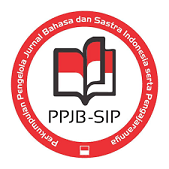IMPLEMENTASI PROGRAM GERAKAN LITERASI SEKOLAH (GLS) DI SMA NEGERI 1 SINGARAJA
DOI:
https://doi.org/10.23887/jjpbs.v7i2.11966Abstract
Penelitian ini bertujuan untuk mendeskripsikan (1) pelaksanaan program Gerakan Literasi Sekolah (GLS) SMA Negeri 1 Singaraja jika dikaitkan dengan indikator kinerja pencapaian fokus kegiatan dalam pengembangan literasi sekolah, (2) kendala yang dihadapi, dan (3) manfaat yang didapatkan dari pelaksanaan program tersebut. Penelitian ini menggunakan rancangan penelitian deskriptif kualitatif. Subjek dalam penelitian ini adalah kepala sekolah, kepala perpustakaan, guru Bahasa Indonesia, guru pelajaran lain, serta perwakilan siswa. Objek penelitian ini sesuai dengan masalah penelitian. Pengumpulan data dalam penelitian ini menggunakan metode observasi dan wawancara. Data diolah melalui beberapa tahap, yaitu reduksi data, klasifikasi dan deskripsi data, interpretasi data, serta penyimpulan data. Hasil penelitian ini menunjukkan SMA Negeri 1 Singaraja mampu melaksanakan 20 indikator dari 26 indikator kinerja pencapaian fokus kegiatan dalam pengembangan literasi di sekolah. Kendala yang dialami dalam pelaksanaan program GLS SMA Negeri 1 Singaraja, di antaranya keluhan terhadap jam masuk dan pulang sekolah akibat literasi, kurangnya pendanaan kegiatan literasi, seringnya tersitanya jam pembelajaran pertama, dan lain sebagainya. Manfaat yang dirasakan dalam pelaksanaan GLS SMA Negeri 1 Singaraja, yakni di antaranya siswa aktif dalam menghasilkan karya tulis, terciptanya kebiasaan membaca di kalangan siswa, fasilitas pendukung literasi sangat membantu guru dan siswa, dan lain sebagainya.Kata Kunci : Implementasi, literasi, sekolah
This study aimed at describing (1) the implementation of the School Literacy Program (SLP) of SMA Negeri 1 Singaraja if it was associated with performance indicators of the achievement of the focus of activities in school literacy development, (2) the obstacles encountered, and (3) the benefits of the implementation of the program. This research used descriptive qualitative research design.The subjects of this study were principals, head librarians, Indonesian teachers, other lesson teachers, and student officers. The object of this study was in accordance with the research problem. The data was collected through observation and interview method. The data was processed through several stages, namely reduction of data, classification and description of data, data interpretation, and conclusion.The results of this study indicated that SMA Negeri 1 Singaraja was able to carry out 20 indicators of 26 performance indicators achievement of the focus of activities in the development of literacy at schools. The obstacles experienced in the implementation of the SLP SMA Negeri 1 Singaraja, including complaints against the hours of entry and return of school due to literacy including lack of funding literacy activities, frequent preoccupation of the first learning hours, and so forth. The perceived benefits of the implementation of SLP in SMA Negeri 1 Singaraja were students were active in producing papers, the improvement of reading habits among students, literacy supporting facilities which were very helpful for teachers and students, and others.
keyword : Implementation, literacy, school
Published
2017-10-04
Issue
Section
Articles
License
Authors who publish with the Jurnal Pendidikan Bahasa dan Sastra Indonesia Undiksha agree to the following terms:- Authors retain copyright and grant the journal the right of first publication with the work simultaneously licensed under a Creative Commons Attribution License (CC BY-SA 4.0) that allows others to share the work with an acknowledgment of the work's authorship and initial publication in this journal
- Authors are able to enter into separate, additional contractual arrangements for the non-exclusive distribution of the journal's published version of the work (e.g., post it to an institutional repository or publish it in a book), with an acknowledgment of its initial publication in this journal.
- Authors are permitted and encouraged to post their work online (e.g., in institutional repositories or on their website) prior to and during the submission process, as it can lead to productive exchanges, as well as earlier and greater citation of published work. (See The Effect of Open Access)







